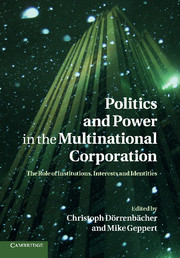 Politics and Power in the Multinational Corporation
Politics and Power in the Multinational Corporation Book contents
- Frontmatter
- Contents
- List of figures
- List of tables
- Notes on contributors
- Foreword
- Part I Introduction
- Part II Politics and power in MNCs: institutions, social embeddedness and knowledge
- Part III Politics and power in MNCs: headquarters–subsidiary relations
- 5 Conflict in headquarters–subsidiary relations: a critical literature review and new directions
- 6 Intra-organizational turbulences in multinational corporations
- 7 Conflicts in headquarters–subsidiary relationships: headquarters-driven charter losses in foreign subsidiaries
- 8 Headquarters–subsidiary relationships from a social psychological perspective: how perception gaps concerning the subsidiary's role may lead to conflict
- Part IV Politics and power in MNCs: role of national identities and identity work
- Part V Conclusions
- Index
- References
5 - Conflict in headquarters–subsidiary relations: a critical literature review and new directions
Published online by Cambridge University Press: 26 April 2011
- Frontmatter
- Contents
- List of figures
- List of tables
- Notes on contributors
- Foreword
- Part I Introduction
- Part II Politics and power in MNCs: institutions, social embeddedness and knowledge
- Part III Politics and power in MNCs: headquarters–subsidiary relations
- 5 Conflict in headquarters–subsidiary relations: a critical literature review and new directions
- 6 Intra-organizational turbulences in multinational corporations
- 7 Conflicts in headquarters–subsidiary relationships: headquarters-driven charter losses in foreign subsidiaries
- 8 Headquarters–subsidiary relationships from a social psychological perspective: how perception gaps concerning the subsidiary's role may lead to conflict
- Part IV Politics and power in MNCs: role of national identities and identity work
- Part V Conclusions
- Index
- References
Summary
Introduction
The objective of this chapter is to provide a critical overview over recent theory-based research on multinational corporations (MNC) conflict. In particular, we seek to understand and explicate the contributions of the various theoretical approaches and perspectives applied in international business (IB) research towards the analysis of conflictual situations and processes in MNC contexts. In modeling conflict in MNC international business, authors draw on diverse theoretical traditions, including psychology, sociology and economics as well as organizational conflict theory. We wish to critically fathom their respective potential for the description and explanation of MNC conflict and, in addition, provide some insights into the theoretical lacunae remaining within the IB conflict research: where and how can we better integrate and extend conflict research in the IB field in order to fully capitalize on the theoretical advancements in conflict research at large? And where do we need to adjust concepts and constructs drawn from related fields to better account for the complex context of MNC conflicts? For reasons expounded upon below, the critical review concentrates on conflicts arising in the MNC headquarters–subsidiary relationship.
Since the MNC as an organization has become an object of study in its own right, it has been characterized as an inherently conflictual arena (Bartlett and Ghoshal 1989; Doz and Prahalad 1991; Gladwin and Walter 1980; Pahl and Roth 1993; Prahalad and Doz 1987).
- Type
- Chapter
- Information
- Politics and Power in the Multinational CorporationThe Role of Institutions, Interests and Identities, pp. 139 - 190Publisher: Cambridge University PressPrint publication year: 2011
References
- 35
- Cited by
